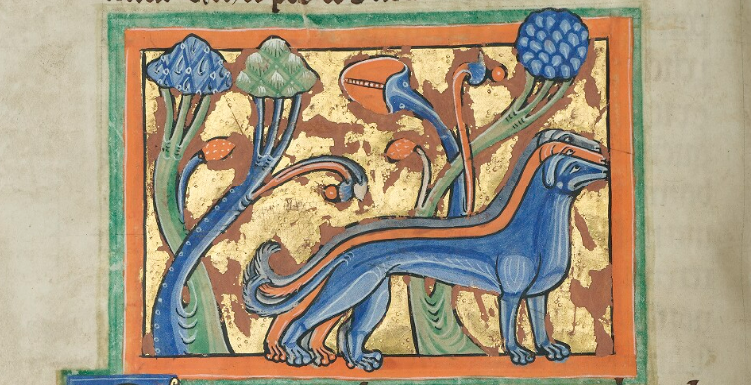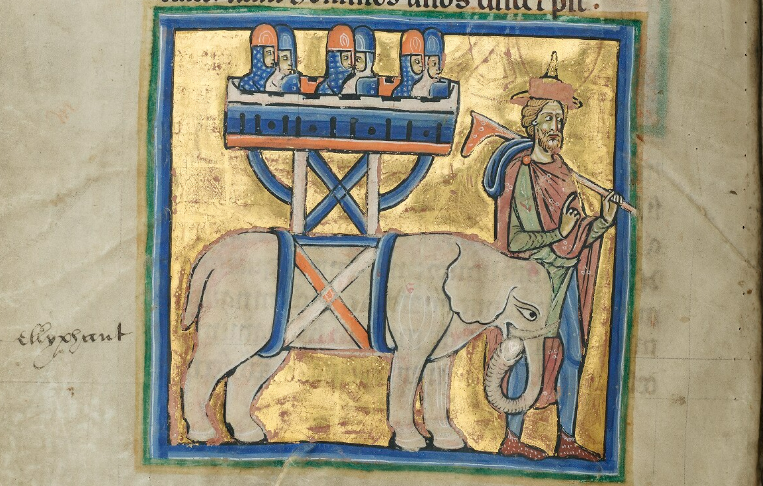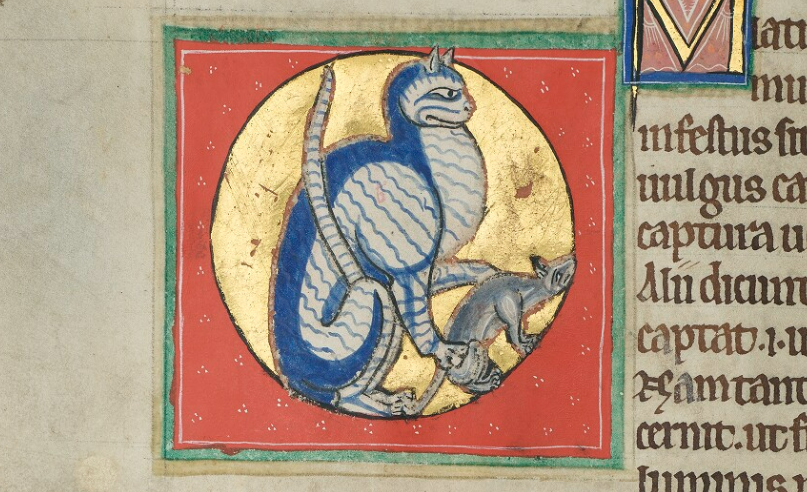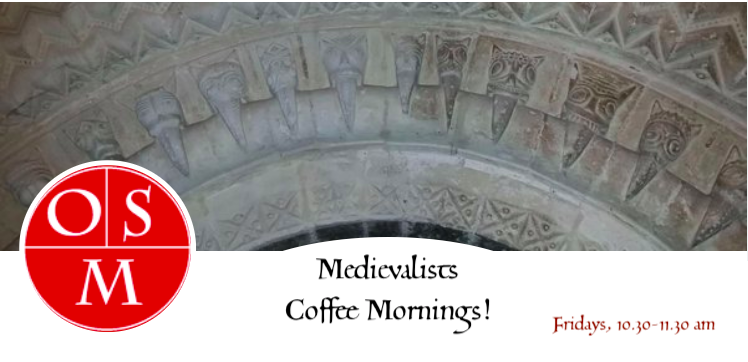Has a whole week really flown by already? They do say that time always flies when you’re having fun, and we’ve already been blessed with a wealth of amazing medievalist events! Every term when I assemble the booklet, I am always in awe of the great number of things on offer. Thank you to everyone who sent updates, corrections and omissions to the booklet. Here is some wisdom from the Epistolae project which sums up the work of the communications officer:
Divitis ingenii tibi copia dives abundat,
Quo potes erratus attenuare meos.
[A rich supply of rich wit abounds in you,
by which you might lessen my errors.]
A poem from Baudri to Muriel of Wilton
Thank you to all who lessened my errors this week! The updated booklet can from now on be viewed, in all of its high-resolution glory, on our website here. This is a live and updateable document, so please do send any further corrections or adjustments to me throughout the term. You can also keep track of the term’s happenings via our google calendar, visible on the side of our blog.
For this week’s round up, please see below:
ANNOUNCEMENTS:
- Teaching the Codex is running a small workshop on Hybridity (17th May, 14:00, Merton College): What constitutes hybridity in manuscript material, and how do we teach it? In teaching contexts which are often highly categorised, how can we find pedagogical value in such hybridity? Topics for discussion include how we teach texts transmitted in both manuscript and print; how we can help students to get to grips with instances of hybrid materiality in manuscript text; and the challenges and opportunities of teaching multilingual manuscripts. There are a very limited number of additional places available. You can register at http://bit.ly/TtCWorkshopRSVP (the form will close when the places have been filled).
- You are invited to celebrate the publication of Karl Kügle, Ingrid Ciulisova, Václav Žůrek (eds) Luxembourg Court Cultures in the Long Fourteenth Century:Performing Empire, Celebrating Kingship (Woodbridge: Boydell Press, 2024) Senior Common Room, Wadham College, Tuesday, 30 April, 6-7 pm. Speakers: Zoë Opačić (Birkbeck), Mark Whelan (Queen Mary), Václav Žůrek (CAS Prague). RSVP: Karl Kügle.
- Save the date: booklaunch! Siân Grønlie’s The Old Testament in Medieval Icelandic Texts will have a launch party on 22 May 5:30-7pm: https://occt.web.ox.ac.uk/event/book-launch-of-the-old-testament-in-medieval-icelandic-texts-translation-exegesis-and-storytel.
EVENTS THIS WEEK:
Monday 29th April:
- The Medieval Latin Manuscript Reading Group meets at 1-2pm on Teams. A friendly venue to practice your Latin and palaeography on a range of texts and scripts. We will read a very entertaining account of the legendary foundation of Cambridge University by the Carmelite friar Nicholas Cantlow. Sign up to the mailing list to receive weekly updates and Teams invites. https://web.maillist.ox.ac.uk/ox/info/medieval-latin-ms-reading
- The Tolkien 50th Anniversary Seminar Series meets at 5pm in the Summer Common Room, Magdalen College. This week’s speaker will be Hugo Lacoue-Labarthe (Exeter College, University of Oxford), Tolkien’s Lancelot in The Fall of Arthur: the living memory of a decaying world. For more information, please see https://tolkien50.web.ox.ac.uk/.
- The Medieval History Seminar meets at 5pm in the Wharton Room, All Souls College and on Teams. The Teams session can be accessed by logging in to Teams with your .ox.ac.uk account and joining the group “Medieval History Research Seminar” (team code rmppucs). Alternatively, you can use this link. If you have any difficulties please email: medhistsem@history.ox.ac.uk. This week’s speaker will be Elisabeth Lorans (Tours/All Souls), ‘The transformation of the monastic enclosure at Marmoutier (Tours, France) between the 11th and the early 13th century‘.
Tuesday 30th April:
- The Medieval English Research Seminar meets at 12.15pm in Lecture Room 2, English Faculty. This week’s speakers will be Fred Morgan (Merton College, Oxford) Title TBC and Simon Heller (Lincoln College, Oxford), Rewriting Heorot in American Fiction. Seminars followed by a sandwich lunch. All welcome!
- A Creative-Critical Afternoon , organised by Dr Laura Varnam, will take place at 2.30pm-4.30pm at University College (the Swire Seminar Room). There will be short talks from colleagues on their current creative-critical projects (ranging from poetry to performance, trade books to medievalism) and we’ll be discussing the benefits, opportunities, and challenges in this kind of work. There will also be chance to discuss using creative writing and creative responses in teaching. The hope is that we’ll get a sense of the vibrant work being done in this area in our period group and that there will be opportunities for future collaborations.
- Queer and Trans Medievalisms: A Reading Group meets at 3pm, at Univ, and online. Today’s topic will be The questioning of Eleanor Rykener (London, 1394/5). All extremely welcome, both in-person and online! To join the mailing list and get texts in advance, or if you have any questions, email rowan.wilson@univ.ox.ac.uk
- The Medieval Church and Culture Seminar will go on a visit to the Ashmolean for a handling session with Jim Harris, 3:30-5pm. Limited numbers; sign up: Lesley Smith.
- Third Lyell Lecture: Cross-fertilization and the limits of the genealogical method: the case of Catullus at 5.15 at the Weston Library lecture theatre by Stephen Oakley (Cambridge): Copying the Classics (and Fathers): explorations in the transmission of Latin text. Book her for in-person attendance or live-stream.
- The Medieval Poetry Reading Group meets at 4pm in the Colin Matthew Room, Radcliffe Humanities Building. This week’s theme will be Introducing Medieval Japanese Poetic Forms: Sugawara no Michizane’s Poetry. This is an activity of the TORCH Network Poetry in the Medieval World. For more information, you can refer to our website https://torch.ox.ac.uk/poetry-in-the-medieval-world; you can also contact Ugo Mondini.
Wednesday 1st May:
- The Medieval German Graduate Seminar meets at 11.15am in Oriel College King Edward Street 7 (Annette Volfing’s office; press the intercom buzzer to be let in). The topic for this term is Konrad von Würzburg: ‘Der Schwanritter’ and this week Marlene will be leading a close reading of the Marteneheschema and links with ‘Parzival’. Open access edition here. If you are interested to be added to the teams group for updates, please contact Henrike Lähnemann.
- The Medieval Latin Document Reading Group meets at 4-5pm on Teams. A document is sent out in advance but homework is not expected. Please contact Michael Stansfield for further details and the Teams link.
- The Late Antique and Byzantine Seminar meets at 5pm at Ioannou Centre for Classical and Byzantine Studies, 66 St. Giles, Oxford, and online via Teams. Teams link: https://msteams.link/FW0C. This week’s speaker will be Polymnia Synodinou (University of Crete) – ‘The Church of the Holy Apostles (Hagioi Apostoloi) at Kavousi, Crete: Aspects of Byzantine Art under Venetian Rule’.
Thursday 2nd May:
- The Environmental History Working Group meets at 12.30-2pm in the Merze Tate Room, History Faculty. This week’s speaker will be Ben Stemper, “The Nature of Utopia: The ecological foundations of Joseph Déjacque’s anarchist utopianism (c. 1850s)”. We try to keep discussions informal, and we encourage anyone at all interested in these kinds of approaches to join our meetings, regardless of research specialism or presumed existing knowledge. For updates on meeting details, refer to the EHWG tab on the Environmental History website. For further information or to join the EHWG mailing list, please email environmentalhistoryworkinggroup-owner@maillist.ox.ac.uk
- The All Souls Seminar in Medieval and Early Modern Science meets at 2-3.30pm in the Hovenden Room, All Souls College. This week’s speaker will be Jeremy Schneider (Trinity College, University of Cambridge), Authenticating Nature: Fossils and Fakes, 1590-1620.
- The Germanic Reading Group meets at 4pm online. Please contact Howard Jones to request the handouts and to be added to the list. This week will be on Old English charms/remedies (Morgan leading).
- The Medieval Women’s Writing Reading Group meets at 5-6.30pm in Lincoln College, Lower Lecture Room. This week’s theme is Chinese Medieval Women’s Writers. Stay up to date with events by joining our mailing list or following us on X @MedievalWomenOx. Texts for the reading group are shared on the mailing list.
Friday 3rd May:
- The Medieval Coffee Morning meets as usual 10:30am in the Visiting Scholars Centre of the Weston Library (instructions how to find it) with presentation of items from the special collections, coffee and the chance to see the view from the 5th floor terrace. This week, Thea Gomelauri will present medieval Hebrew manuscripts.
Finally, we cannot always send out email updates, but if you learn of new events, changes to schedules etc. we will always disseminate them on our social media, especially via X/Twitter. Do make sure to follow to keep up with all of the latest updates. And please do send any and all updates or corrections to me – I am reassured by this eighth-century letter from Eangyth that corrections are a historical inevitability:
postulamus pietatem tuam, ut tua rescripta trans pontum dirigere digneris et respondeas his, quibus in his kartis caraxavimus rustico stilo et inpolito sermone
A letter from Eangyth, abbess (719-22)
[We beg you also to be so kind as to send us word across the sea in reply to what we have scribbled in this letter in our rude, unpolished speech.]
With that said, I wish you a week free from errors wherever possible, and in my rude and unpolished speech hope that you all have a lovely week 2!

St John’s College MS. 61, f. 41 v.
By permission of the President and Fellows of St John’s College, Oxford
Viewable in full at Digital Bodleian

















